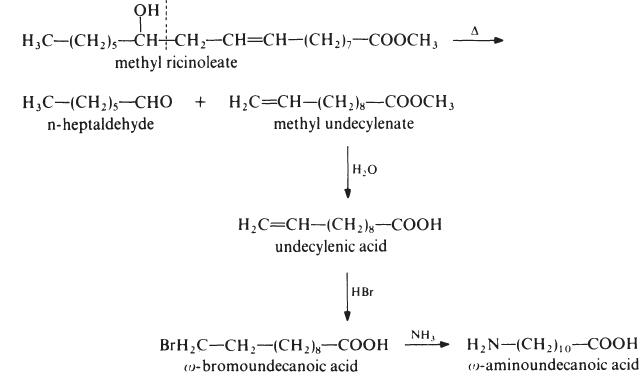| Description | Aminoundecanoic acid can be used as a PROTAC linker in the synthesis of PROTACs. Aminoundecanoic acid is an alkane chain with terminal carboxlic acid and amine groups. The amino group (NH2) is reactive with carboxylic acids, activated NHS esters, carbonyls (ketone, aldehyde) etc. The terminal carboxylic acid can react with primary amine groups of activated NHS ester to form a stable amide bond. |
| Chemical Properties | White crystalline powder |
| Chemical Properties | 11-Aminoundecanoic acid is a solid. |
| Uses | 11-Aminoundecanoic Acid is used to prepare thapsigargin analogues targeting apoptosis to prostatic cancer cells. It is also used to synthesize N-carboxyalkylpeptides containing extended alkyl residues at P1''as matrix metalloproteinase inhibitors. |
| Definition | ChEBI: 11-Aminoundecanoic acid is a medium-chain fatty acid. |
| Preparation | |?-Aminoundecanoic acid is normally prepared from castor oil (glycerol
triricinoleate). Firstly the castor oil is subjected to methanolysis to yield the
methyl ester of ricinoleic acid and then the following route is used:

In the first step, the pyrolysis of methyl ricinoleate is carried out at about
500??C; the principal products are n-heptaldehyde and methyl undecylenate.
The latter is hydrolysed to give undecylenic acid which is treated with
hydrogen bromide in a non-polar solvent in the presence of a peroxide.
Under these conditions, reverse Markownikoff addition occurs and the main
product is |?-bromoundecanoic acid. This product is then treated with
ammonia to give |?-aminoundecanoic acid, which is a crystalline solid, m.p.
189??C. |
| General Description | White crystalline solid or powder. |
| Air & Water Reactions | Insoluble in water. |
| Reactivity Profile | 11-Aminoundecanoic acid is incompatible with strong oxidizing agents, strong acids and strong bases. |
| Fire Hazard | Flash point data for 11-Aminoundecanoic acid are not available; however, 11-Aminoundecanoic acid is probably combustible. |
| Flammability and Explosibility | Nonflammable |
| Safety Profile | Poison by ingestion. Questionable carcinogen with experimental carcinogenic and neoplastigenic data. Mutation data reported. When heated to decomposition it emits toxic fumes of NOx,. |



